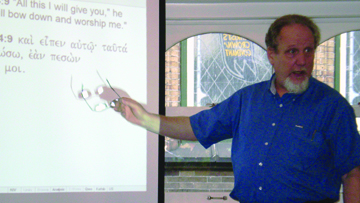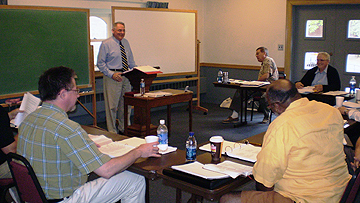You have free articles remaining this month.
Subscribe to the RP Witness for full access to new articles and the complete archives.
Jesus and the apostles were returning from a time of ministry, in which there had been “many coming and going, and they had no leisure so much as to eat” (Mark 6:31–32). Jesus called His disciples to “come apart…and rest a while” (Mark 6:31–32). It was not to be as much a time of leisure as a time of communion with the Lord, a time of being revived in His presence, in the life of His words.
Today pastors know that same weariness. Alternative belief systems, a kaleidoscope of activities, and crushing personal crises in the congregational family press upon them. They seek to pull the pastor away from his calling to feed and nurture the Lord’s flock toward a role of quick answer man, activity administrator, and dispenser of problem-solving possibilities.
Though diligent in his desire to serve the Lord and his people, even conducting the regular ordinances of the church can take on a sense of routine rather than worship. Still the quiet call offers the desired respite: “Take My yoke upon you and learn of Me” (Matt. 11:29).
Perceiving the necessity for pastors to come apart for study to renew their strength, the Reformed Presbyterian Theological Seminary (RPTS) now offers a doctor of ministry degree (D.Min). Dr. Jerry O’Neill, president of the seminary, explains that the degree simply enlarges upon the seminary’s 200-year commitment to equip men for the pastorate. “It is an opportunity to minister to pastors, which in turn ministers to God’s people and advances the cause of Christ and His Church.”
Appropriately, the degree is named Strengthening Pastoral Ministry.
To revive pastors’ hearts and the heart of pastoral ministry, the degree is designed to deepen scriptural knowledge and understanding as well as enhance the skills to impart that knowledge to their flocks and apply it to everyday life. That RPTS professors themselves have significant experience as ministers of the gospel further enriches the pastoral quality of the program.
Holding fast to the faith once delivered, and believing that the Scripture declares itself fully sufficient for all matters pertaining to life and faith, the scope and content of the degree conforms to the scriptural pattern for the pastorate. “First and foremost, pastors are to be men of the Word of God, called primarily to present Christ in all His fullness through the preaching and teaching of the Scriptures, to edify the church and extend the call of the gospel to those outside the church,” says D.Min. program director Dr. Jack Kinneer.
Rather than theological/sociological academic pursuit, the RPTS doctorate is distinctive in its focus to increase understanding in sound doctrine so that pastoral labor may be as faithful and effectual as possible. Strengthening Pastoral Ministry might be described as advanced theological study for enhanced pastoral practice.
“When the biblical pattern is followed for ministry of the Word and church order, the church is able to fulfill its calling to instruct and encourage,” said Kinneer. “Lives are transformed and given stability. The call is upward in the light of God’s Word with its directives for abundant and eternal life, rather than downcast in a problem-driven/problem-solving mode.” Although most pastors are lifelong learners who pursue serious private study, the strain on their focus can deter the desired growth for ministry. “Strengthening Pastoral Ministry” addresses this shortcoming by setting a sequential path of the following eight courses that encompass the full scope of pastoral responsibility.
Christ in the Gospels—Rediscovering Jesus through Narrative and Literary Analysis Professor: Dr. Jack Kinneer
“Attention to the language paradigms of the original Greek enhances proper understanding and application,” says Kinneer. “Examination of the four Gospel accounts reveals one gospel in depth and dimension, to be preached presenting Christ and truth for real-life issues, not as little stories.”
The Old Testament in the New—Advancing the Reformed Conviction of the Unity and Coherence of Scripture Professor: Dr. Dennis Prutow
“Conveying to God’s people the unity of the Scriptures and its redemptive history increases their confidence in the veracity of the Bible,” Prutow comments. “Seeing how the New Testament writers quote, build on and enlarge upon the Old imparts weight and depth of meaning which single proof-text messages cannot demonstrate.”
Christ’s Mediatorial Kingship—Proclaiming Christian Faith in a World of Ideological Diversity Professor: Dr. Richard Gamble
The course addresses how we live as faithful saints in a secular society. Current religious, social, and political issues are analyzed along with Christian responses in the light of Christ’s kingship.
Issues in Theology—Reformed Orthodoxy and Current Trends and Directions in Theological Studies Professor: Dr. Richard Gamble
Students survey current trends, deviations from orthodoxy, and their impact on the church, its members, and ultimately society.
Leadership Communication—Learning to Effectively Communicate in Diverse Cultural Settings Professor: Dr. Calvin Troup
Appropriate communications forms and technologies are explored and applied to varied situations of ministry.
Renewal of Preaching—Values, Insights and Techniques for Preaching Professor: Dr. Dennis Prutow Often not covered in other ministerial programs, providing a clear procedure for sermon development around one main point not only simplifies preparation but enhances the clarity and impression of the message for the congregation. Dr. Prutow attests that “homiletics experts are unanimous in their conclusion that building the sermon around one truth, and leading the congregation to that truth, is the most effectual sermon model.”
Biblical Worship—Recovering the Depth, Beauty and Comprehensiveness of Worship Regulated by the Word of God Professor: C.J. Williams
A deeper appreciation is gained for the order and purpose of public worship as scripturally directed and followed in the history and practice of Reformed and Presbyterian Churches. Contemporary trends are also reviewed.
Counseling the Flock—Insights for Guiding the Sheep According to the Scriptures Professor: Dr. George Scipione
This course is designed to enhance pastoral skills in listening, analyzing, and counseling members of the congregation so that they may know the fullness of life and hope in Christ. Study for the D.Min. program begins with two six-day courses in August, and continues with designated weeks in February, June, and again August over a period of three calendar years. Pre-class and post-class assignments for each course are designed not only to accomplish academic requirements but also to provide students with immediate resources for their pastoral labor. For instance, in the Gospels course, sermons are prepared from the material studied.
All eight weeks of intensive instruction are taken in the “cohort model.” In this way, pastors learn not only from pastoral professors, but also from one another. Dr. Charles Butler, associate pastor of an American Presbyterian congregation and member of the inaugural D.Min. cohort, likens it to “presbytery with a more limited goal…where appreciation and affection for fellow students grows and prayer interest is established.”
Another doctoral candidate in the first group, Barry Witt, recalled his cohort experience in his masters study at Geneva College, and “jumped at this opportunity because the camaraderie is unlike that in any other classroom setting.”
“And this program is clearly designed by men who have been in my shoes,” says Witt. “Though I have been preaching for more than 25 years, the Renewal of Preaching course has helped me to re-hone my skills in ways that have brought freshness and new vigor to my pulpit ministry.” Within a year of the pastor’s completion of the required courses, the doctoral thesis is to be submitted. Focusing on one aspect of the pastoral office, original scriptural research in the original language will form the basis of practical counsel for pastors. Consistent with the heart of Strengthening Pastoral Ministry, every thesis is intended to be a viable resource for ministers across the Reformed and evangelical church for years to come.
The first cohort of eight candidates, who began their work in August 2007, are still going strong as they approach the halfway mark. They find the focused study reinvigorating, and deeper knowledge of the Word infusing new life into their work.
Dr. Prutow, who while a pastor for Sterling Reformed Presbyterian Church earned a D.Min. degree from Reformed Theological Seminary, “came apart” for this type of study. “The scope required that I examine areas and aspects of ministry which I might not have delved into on my own,” Prutow said. “It made me branch out. It also gave me a much broader perspective of the church as I studied with pastors from other denominations. Overall, for me personally, there was a renewed strength from an increase in the knowledge of the Scriptures.”
The blessings Dr. Prutow experienced earning his D.Min. were enjoyed by all. RPTS board member Don Reed, a member of Dr. Prutow’s Sterling, Kan., congregation at the time, recalls how they benefited from their pastor’s sacrifice and effort—and how much they appreciated it: “There was an added richness in sermon content as well as a new strength of conviction in his preaching. He passed along to us both the gain and joy of his study.”
The Geneva Bible sums up the instruction of 1 Timothy as, “setting forth a perfect pattern of a true Pastor, whose office especially consisteth in teaching.” A good minister of Jesus Christ, Paul wrote, is nourished in the words of faith and good doctrine. Excellence for Christ’s crown and covenant is the imperative of this high calling. As doctoral candidate John Stanko observes, “More than ever it is important to know what we believe and why we believe it. Every day the people in our churches encounter expertise in other areas. They should also expect it from the church, and we, as leaders, should be prepared to deliver on that expectation.”
Dr. O’Neill encourages seasoned pastors in the RPCNA who feel the need to strengthen their ministry service to enroll in the new D.Min. program: “Let your pastor’s heart and the heart of your pastoral ministry be refreshed, revived, and reinvigorated. Your church will thank you.” While he hopes that the RPCNA Church Revitalization Committee’s developing efforts might be a future avenue of fostering enrollment of RP ministers in the D.Min. program, Dr. O’Neill strongly urges RP sessions to encourage their pastors now to take advantage of this program and do whatever they can to help with the cost of tuition and transportation for their pastors to participate. “Your church will thank you!”
—Beverly Simpson
Beverly Simpson is a part-time student in the master of theological studies program at the Reformed Presbyterian Theological Seminary (RPTS) in Pittsburgh, Pa.

